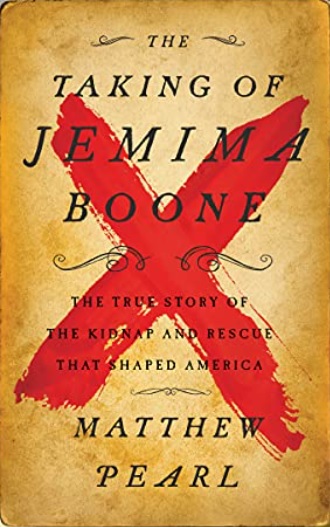
If ever you have the need to make me happy just give me a gift card to buy some books. That’s what I had in my hand when I found The Taking of Jemima Boone. I must admit, the dull cover image paled in comparison to that super intense title.
For the past few years I have been on a journey to learn more about the earliest days of the American colonies and how people lived then. It’s been eye opening for sure! Although my research generally is limited to the history of New England so I didn’t know a damn thing about Danial Boone or the kidnapping of his daughter by a Cherokee-Shawnee raiding party in what would later be named Kentucky.
I picked up this book with high hopes it would be telling a great historical narrative from a female point of view – something that is severely lacking here in the US. Indeed, the beginning of the book does tell the story about how a 14-year-old girl, her 16-year-old sister, and a friend were taken by the natives and marched for several days through the wilderness as her legendary father and crew tracked them. It showed her tenacity and intelligence leaving clues behind for her father to find but ultimately – that’s where the excitement ended in the first couple chapters.
The rest of the book was world building – trying to get the reader to understand what was going on with the colonists, the indigenous people, the English overseas (including the king!) and even the French. In agonizing detail it told us all about all the leading men of the day and how they were dealing with each other and the politics involved in the situation. What gets COMPLETELY lost in the narrative is the very real human Jemima Boone. She’s completely overwhelmed by the shadow of her larger-than-life father who gets far more of this book than she did. Also missing were what she was thinking/doing/feeling. This read like a textbook. Completely impersonal and missing the humanity under it all.
It might not be the author’s fault – Jemima was a woman (or rather child) of her day. She was kept purposely illiterate as women folk weren’t supposed to be troubling their minds with a proper education. The most distressing part of this entire narrative tells how upon coming home she immediately “falls in love” and gets married to a 23-year-old in a double wedding with her sister who was hitched to a man in his thirties despite only being 16 herself. It’s written like a romance not like the very real manipulative toxic patriarchal horror story it is. As someone raised as a girl/woman I could see what this male author could not – that this was not a love story – it was a brutal manipulation to keep this girl domesticated. During her kidnapping she showed she was smart, very smart, and there’s nothing more damning to the patriarchy than a brilliant teenage girl. Being pressured into marrying a much older man almost immediately upon coming home was just another way to keep her under someone’s thumb. There’s not a single mention of this. Not one. I was so distressed reading it like a textbook romance cross. Yuck!
But with that being said the author did seem to try and be sensitive towards other topics – like the natives and their motivations and I learned a great deal about their philosophies and inner workings. It was loaded with facts. TONS OF DRY WHOLESALE FACTS. At points they were interesting – like did you know an indigenous chief SAILED ACROSS THE SEA to meet the King of England in a futile attempt to resolve the whole land and ownership issue??? IN THE 1700’S!
Honestly, this book did create quite an emotional reaction in me. I was close to yelling at the end, like you would yell at the Jerry Springer Show on TV. Because none of these men were fucking talking to each other or trying to solve ANYTHING. It’s a story steeped in petty grievance and revenge and ahhhhhh!!
Sorry. I may just be entirely too pissed off at the patriarchy and was just super disappointed this book wasn’t more about Jemima. Other than that it was a crazy dense read and I honestly wouldn’t suggest it to anyone that wasn’t already super interested in Danial Boone, or early Kentucky history, or something else related. But if that person is you, you can find it on Amazon.

